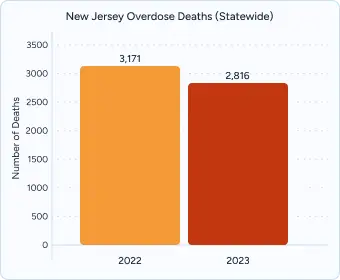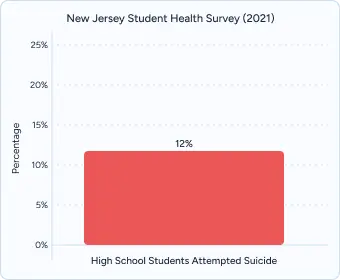Cherry Hill Addiction Treatment & Mental Health Resources Guide

Dr. Rostislav Ignatov, MD
Chief Medical Officer
Cherry Hill, like much of Camden County, experiences significant behavioral health challenges consistent with statewide trends in New Jersey. In 2023, the state reported 2,816 unintentional overdose deaths, down from 3,171 in 2022. While this marks the first meaningful decline in over a decade, overdose deaths remain among the highest in the nation. Within Camden County, residents accounted for 7,390 substance-use treatment admissions in 2023, one of the highest totals in the state. Cherry Hill residents contribute substantially to this treatment demand, accessing services such as detoxification, residential care, and outpatient counseling.
Cherry Hill’s behavioral health landscape includes access to local community health centers, county-operated crisis screening services, peer recovery programs, and outpatient mental health counseling. Residents may use NJ FamilyCare (Medicaid), which covers comprehensive behavioral health and substance use disorder services. The state has continued to integrate behavioral health into managed care to improve coordination, enhance continuity of care, and reduce systemic barriers to treatment.
This guide is intended to help Cherry Hill residents better navigate available addiction, mental health, and recovery resources in Camden County highlighting how residents can connect with community supports, statewide services, and recovery networks like The Haven Detox – New Jersey.

The estimated percentage of adults in Camden County who have depression is about 20.5% in data from 2020-2022.

In 2023, Camden County reported 7,390 substance-use disorder treatment admissions, ranking among the highest of all counties in New Jersey. This figure represents a significant rise from 2022, when the county recorded 5,627 admissions.

At the state level, overdose deaths decreased to 2,816 in 2023 compared with 3,171 in 2022, reflecting the first broad decline across all racial and ethnic groups in nearly ten years. Despite this progress, overdose-related harms remain a central public health concern in both Camden County and Cherry Hill.

The Annie E. Casey Foundation’s Kids Count found that more than 10% of New Jersey children—about 168,000—experienced anxiety or depression in 2020, up sharply from just a few years earlier. In addition, a Rutgers/New Jersey State Policy Lab study reported that around 42% of high school students in the state felt persistently sad or hopeless, with similar findings among middle school youth.

The crisis is also reflected in the 2021 New Jersey Student Health Survey, which revealed that nearly 12% of high school students reported attempting suicide within the past year. These troubling figures highlight the urgent need for stronger school-based interventions, expanded family supports, and timely access to professional counseling in communities like Cherry Hill.

Cherry Hill is supported by a combination of local and statewide behavioral health resources that provide access to addiction and mental health services. New Jersey has strengthened its crisis system through the 988 Suicide & Crisis Lifeline and Mobile Crisis Outreach Response Teams (MCORTs), which are available statewide to assist with non-life-threatening behavioral health and substance use emergencies. These teams provide in-person outreach, de-escalation, and linkage to follow-up care when needed.
For children and adolescents, Children’s Mobile Response and Stabilization Services (CMRSS) are available in Camden County. These teams provide on-site crisis intervention for youth up to age 21, with the goal of stabilizing challenges in the community to avoid unnecessary hospitalizations or restrictive placements.
In Cherry Hill, residents have access to county-based Psychiatric Emergency Screening Services (PESS), outpatient counseling, peer-led recovery initiatives, and community wellness programs. Camden County-supported health centers and crisis screening locations provide 24/7 evaluations, stabilization, and referral to detoxification or outpatient care. Mobile response and walk-in access further expand reach, particularly for neighborhoods where transportation may be a barrier.
Cherry Hill residents can rely on NJ FamilyCare (Medicaid) for comprehensive coverage of behavioral health and substance use treatment. This includes outpatient therapy, residential rehabilitation, inpatient psychiatric services, crisis stabilization, and medication-assisted treatment (MAT) with buprenorphine, methadone, or naltrexone. Medicaid also supports peer recovery services, family counseling, interpreter assistance, and transportation when medically necessary.
To make sure care is delivered promptly, New Jersey requires all Medicaid providers to follow strict access standards:
Residents can use the NJ FamilyCare online provider directory to find local, in-network clinicians in Cherry Hill or nearby Camden County communities. The tool allows families to confirm availability and search for providers offering bilingual or culturally tailored services.
While public insurance covers a wide range of services, private facilities may provide additional benefits such as:
For residents seeking these advantages, The Haven Detox – New Jersey in Blackwood offers 24/7 admissions support, evidence-based treatment, and personalized care.
Just a short drive from Cherry Hill, The Haven Detox provides trusted, professional care for individuals seeking help with addiction, mental health, and co-occurring mental health challenges. The center offers both medical detox and residential treatment, ensuring clients can safely begin recovery in a supportive environment.
Treatment blends evidence-based therapies, such as cognitive behavioral therapy (CBT) and trauma-informed care, with a comfort-focused setting that includes recreational areas, community spaces, and chef-prepared meals. This approach helps you stabilize physically while also helping you heal mentally.
To personalize treatment, The Haven Detox offers GeneSight® genetic testing, giving clinicians insights into how each client may respond to different psychiatric and addiction medications. This allows for tailored medication options that support recovery with fewer setbacks.
The facility also maintains a 24/7 admissions helpline to answer questions, verify insurance, and arrange immediate placement into care. Families in Cherry Hill and across Camden County can call (856) 677-5226 for fast access to treatment.
Cherry Hill residents have access to a broad range of behavioral health resources designed to support individuals across the lifespan. Local community health centers provide 24/7 crisis evaluations, stabilization, and referral to appropriate levels of care for individuals experiencing mental health or substance use emergencies.
For youth, the Camden Hub of the New Jersey Statewide Student Support Services (NJ4S) initiative provides school-based prevention and intervention programming. This includes brief counseling, crisis intervention, and referrals to community resources, supporting early mental health identification and response for students and families within both schools and neighborhood settings.
Cherry Hill residents benefit from a range of peer-driven recovery resources that emphasize long-term recovery and reduce relapse risk. The Mental Health Association in New Jersey (MHANJ) operates the Peer Recovery Warmline (877-292-5588), staffed by trained peer specialists with lived experience, who provide non-clinical emotional support and navigation assistance.
The New Jersey Division of Mental Health and Addiction Services (DMHAS) formally recognizes Peer Recovery Support Services (PRSS) as a part of the state’s treatment continuum. This allows individuals to integrate peer- or family-run support services into their care plans. Community-based organizations in Camden County also facilitate peer groups, recovery coaching, family-inclusive programs, and life-skills workshops. These services help residents transition from treatment to long-term recovery, strengthening both personal stability and social connections.
For individuals in Cherry Hill completing inpatient or intensive outpatient programs, sober living homes offer structured, substance-free housing that promotes accountability and supports recovery. Multiple Oxford Houses operate in Camden County, providing peer-run housing where residents share responsibilities, attend recovery meetings, and support each other’s sobriety.
Additional transitional housing resources are available through directories such as the Sober House Directory and ChooseHelp, which list certified recovery residences across Cherry Hill and surrounding Camden County communities. These homes typically require adherence to recovery guidelines, including participation in peer-support meetings, regular substance use screenings, and engagement in employment, school, or outpatient treatment. This structure helps individuals bridge the gap between formal treatment and independent living while reducing relapse risk.
Cherry Hill offers a wide network of recovery meetings to meet the diverse needs of the community. Alcoholics Anonymous (AA) meetings are held daily across Camden County, offering beginner sessions, open speaker meetings, and closed meetings for individuals who prefer a confidential setting. Spanish-speaking residents can also access bilingual AA meetings, ensuring cultural inclusivity and accessibility.
Narcotics Anonymous (NA) maintains a strong presence in Cherry Hill and throughout Camden County, with meetings available in English and Spanish. Online directories allow residents to filter options by type, location, or identity focus, including LGBTQ+ affirming groups and bilingual meetings. Together, AA and NA provide peer-led networks that complement clinical care by offering accountability, mentorship, and fellowship for individuals in all stages of recovery.
Choosing the right treatment program can make a significant difference in recovery. For Cherry Hill families and residents, the most effective programs share several important features:
By focusing on these elements, Cherry Hill residents can better identify programs that not only provide treatment but also foster stability, wellness, and long-term recovery.
Recovery doesn’t end when a program is completed. For Cherry Hill residents, the most successful providers begin planning for ongoing care early in treatment to ensure supports are already in place when someone transitions home or into the community.
Effective continuing care in Camden County often includes:
New Jersey’s statewide resources also strengthen local continuing care. Certified Community Behavioral Health Clinics (CCBHCs) and Mobile Crisis Outreach Response Teams (MCORTs) ensure that Cherry Hill residents can quickly re-enter care or stabilize during a setback, closing gaps that might otherwise put recovery at risk.
By blending clinical follow-up, family engagement, and community-based supports, Cherry Hill residents can build sustainable recovery pathways that extend well beyond the initial treatment program.
Cherry Hill’s behavioral health system emphasizes recovery through both immediate stabilization and long-term recovery. Aftercare planning typically begins during treatment and may include relapse-prevention coaching, scheduled check-ins, and transitions into outpatient therapy or peer recovery programs.
Structured recovery residences, such as Oxford Houses in Camden County, provide peer-run sober housing that reinforces accountability and stability in early recovery. These settings, combined with outpatient support, help bridge the gap between clinical treatment and independent living.
Family engagement remains a central element. Programs often provide family therapy or education to strengthen relationships and reduce relapse risks. For individuals without family involvement, peer and community-based support networks ensure ongoing connection and accountability.
Finally, statewide resources such as CCBHCs and MCORTs ensure rapid access to crisis stabilization and re-entry into care, reflecting New Jersey’s focus on continuous and coordinated treatment for those with significant behavioral health needs.
Professional treatment represents an investment in recovery success, offering immediate access, personalized care, and comprehensive services designed to address the complex nature of addiction and mental health conditions.
Residents of Cherry Hill, NJ can access immediate crisis intervention and connection to treatment through public behavioral health systems and community-based supports.
Insurance verification in Cherry Hill is supported by NJ FamilyCare and its managed care partners (Horizon NJ Health, Amerigroup, UnitedHealthcare, Aetna Better Health, and WellCare). These plans cover inpatient and outpatient behavioral health services, crisis stabilization, and medication-assisted treatment (MAT). For uninsured or underinsured residents, Camden County services and nonprofit organizations offer financial assistance, sliding-scale fees, and county-funded treatment options. Case managers and intake staff often assist with insurance eligibility, benefit checks, and prior authorizations to reduce administrative delays and improve timely access to care.
Most behavioral health facilities serving Camden County provide same-day crisis assessments with individualized treatment recommendations. Intake staff coordinate “warm handoffs” between screening centers, detox programs, and longer-term residential or outpatient services, helping reduce disruptions in treatment. Providers also communicate with families, schools, and community supports to encourage continuity of care and sustained engagement.
Most providers in Camden County schedule intake assessments within a few days, but urgent needs can be addressed immediately. Camden County Psychiatric Emergency Screening Service (PESS) provides same-day crisis evaluations. For rapid admission to detox or residential care, The Haven Detox – New Jersey (856-677-5226) operates a 24/7 helpline that offers confidential assessments and fast placement.
Yes. NJ FamilyCare (New Jersey’s Medicaid program) covers counseling, psychiatric services, residential care, crisis stabilization, and medication-assisted treatment (MAT). Managed care partners such as Horizon NJ Health, Amerigroup, UnitedHealthcare, Aetna Better Health, and WellCare extend these benefits. Copays for behavioral health have been eliminated, reducing financial barriers for Cherry Hill residents.
Yes. Cherry Hill residents can access Spanish-language AA and NA meetings, bilingual peer support groups, and counseling services at community health centers. The Haven Detox – New Jersey also has bilingual staff available to guide families through admissions and treatment planning.
Yes. Federally Qualified Health Centers (FQHCs) in Camden County provide behavioral health services regardless of insurance status. Nonprofit programs supported by the NJ Division of Mental Health and Addiction Services (DMHAS) also offer sliding-scale or grant-funded care. The Haven Detox – New Jersey provides confidential insurance verification and can review private payment options if needed.
NJ Transit offers reduced fares for eligible riders, and Medicaid covers non-emergency medical transportation (NEMT) for behavioral health appointments. Some providers, including The Haven Detox – New Jersey, help coordinate rides so clients can access treatment without delay.
Support is always available. Residents can call or text 988 to connect with trained crisis counselors. PESS operates 24/7 for in-person psychiatric stabilization. For families seeking immediate placement, The Haven Detox – New Jersey’s helpline (856-677-5226) is staffed around the clock to assist with admissions.
Yes. Families are essential in recovery. NAMI NJ and Al-Anon provide education, coping strategies, and peer-led support groups. At The Haven Detox – New Jersey, family communication and involvement are included in treatment planning to help loved ones stay connected and supported throughout care.
Integrated care is standard in Camden County. Many programs coordinate psychiatric and substance use treatment under one plan, combining MAT with evidence-based therapies such as CBT, DBT, and trauma-informed care. The Haven Detox – New Jersey also specializes in dual diagnosis treatment.
Let’s talk about what’s going on — no judgment. (We’ve been there before ourselves). No one will know you inquired and there is no commitment to call.
24/7 Support
No Commitment
100% Private
There’s no catch. Checking your insurance is simply a way to see what your plan covers — it doesn’t lock you into treatment, notify anyone, or cost you anything. You get answers upfront to decide what makes sense for you.
Protecting your privacy matters! No information or notifications are ever sent to your employer or family — whether you check your insurance online or call. Everything is handled through secure, encrypted systems that meet strict medical privacy laws. You stay in control of your information!
Luckily, most insurance policies cover treatment here. Depending on the healthcare you’ve already had this year, costs could even be zero. Instead of worrying, let’s just find out what your plan covers.
Most likely. We work with major providers like Cigna, Aetna, and United Healthcare, public insurances like Tricare and tribal plans, and even smaller plans like Surest Bind and Harvard Pilgrim. The quickest way to know for sure is to check online or call. It’s a quick, private way to understand what is covered upfront.
Verifying your insurance isn’t a commitment to start treatment — it’s simply a way to see what your options are. Knowing your coverage ahead of time helps you make more informed, confident decisions. It also helps flag a spot, so you’re able to get right in if you ever do decide you’re ready.
You need your policy number to check your specific policy online. If you want general information, just call. You likely have questions beyond insurance anyway. Reaching out now helps you figure out the right fit if or when you’re ready. You don’t have to put off the call until you’re in crisis. Calling is not scary, I promise!